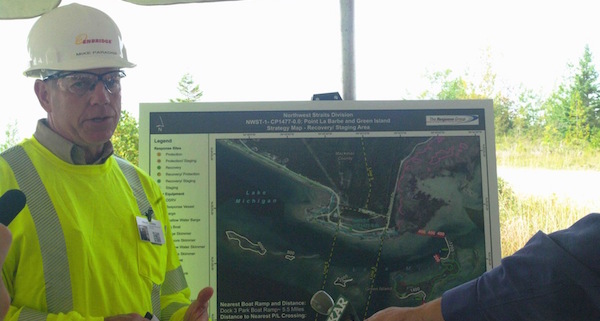
Pipeline Maintenance Supervisor Mike Paradise explains a map that shows booms at places where oil is likely to go if Line 5 were to break. Image: Mahmoud Haidar
By JASMINE WATTS
Capital News Service
LANSING – Some Michigan communities are calling on state officials to shut down an aging oil pipeline between the state’s Upper and Lower peninsulas, even though they lack jurisdiction in the matter.
Line 5 is a 63-year-old oil pipeline owned by Enbridge Inc., a private Canadian company, at the bottom of the Straits of Mackinac where Lake Michigan and Lake Huron meet.
Line 5 now operates at more than 80 percent of its original design capacity. Environmentalists say they are afraid it will rupture.
A 2014 University of Michigan study called it the worst possible place to have an oil spill in the Great Lakes.
Michigan officials are looking at alternatives for moving the oil. A Traverse City-based environmental group says alternative routes exist that do not pass through the Great Lakes.
“The issue of Line 5 is one of the top environmental issues of the Great Lakes,” said Liz Kirkwood, executive director at For Love of Water. “It is a painful reminder that we must prioritize to protect our water over any thing else.”
Kirkwood said she wonders why state officials are not acting immediately, and local communities increasingly send resolutions opposing the pipeline to the governor and state lawmakers. Among them:
– Cheyboygan County recommended Line 5 be restricted to non-oil products including liquid petroleum, gas and propane until a thorough review can be done.
– On Feb. 1, Traverse City passed a resolution to stop the transportation of oil under the Great Lakes and shut down Line 5.
“We feel the risk is too great,” said Benjamin Marentette, city clerk of Traverse City. He says he is concerned with how long state officials are taking to respond.
“Our area would be probably hit first if a catastrophic oil spill occurred,” said Juli Wallin, the Emmet County clerk. Emmet County also passed a resolution suggesting that the pipeline be restricted to its original design capacity and carry only non-oil products.
At least 15 townships and counties have voiced concerns to state officials about how detrimental Line 5 could be to the Great Lakes, according to the Michigan Environmental Council, a coalition of environmental groups.
“Communities sending resolutions is great,” said Andy McGlashen, communications director at Michigan Environmental Council.
“This is a good indication that people are really concerned. It’s not just the coastal communities you’d expect. Genesee County is landlocked and has sent a resolution,” McGlashen said.
“It’s up to leaders at the state level to ultimately decide the fate of the Line 5 pipeline, but we think these local resolutions are an important way to influence that decision by showing that people all over Michigan are concerned about the pipeline and committed to protecting the Great Lakes,” he said.